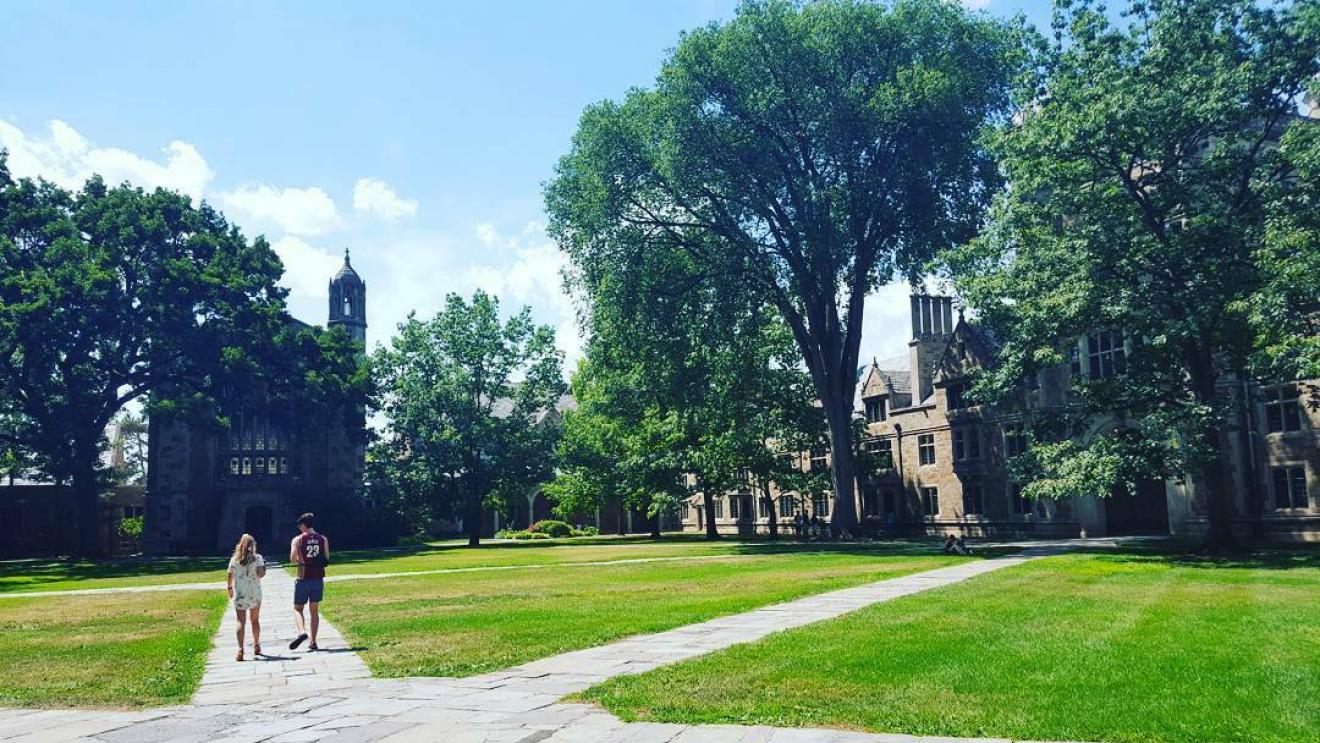Best Higher Education/Higher Education Administration colleges in the U.S. 2026
If you want to become a principal of a middle school or the dean at a college or university, a degree in higher education and administration is the perfect choice for you. Higher education administrators are leaders who build relationships with the faculty, staff, and students to ensure the school as a whole meets the necessary goals set forth, such as decreasing drop-out rates and increasing test scores. Higher education administrators are problem solvers, key decision makers, and critical thinkers. Individuals interested in this career area will need to earn a graduate degree before becoming a higher education administrator. Those with master's degrees pursue mid- or entry-level positions in administrative roles, while individuals who have doctorates become provosts, presidents, and deans. Post-secondary education administrators can also work in the registrar's office, student affairs, and the admissions office.
Academic leadership, counseling, curriculum, law and higher education, cultural diversity in education, faculty and labor relations, and student assessment and admissions are just a few course topics students will cover. The median annual wage for elementary, middle, and high school principals was $86,970 in May 2010, and the median annual wage for post-secondary education administrators was $83,710. These individuals generally work full time; most work year-round to prepare for the upcoming school year, but some schools may reduce their hours during the summer.
Click Here to See the Best Colleges in the USBest Higher Education/Higher Education Administration colleges in the U.S. for 2026

University of Florida offers 2 Higher Education/Higher Education Administration degree programs. It's a very large, public, four-year university in a midsize city. In 2023, 8 Higher Education/Higher Education Administration students graduated with students earning 8 Doctoral degrees.
Boston College is a highly reputable private college located in Chestnut Hill, Massachusetts. They offer three different master’s in higher education programs. Tuition fees are very high at Boston College, and the acceptance rate is very low, with an average accepted GPA of 3.96. Online courses are available.
Texas Christian University offers 1 Higher Education/Higher Education Administration degree programs. It's a large, private not-for-profit, four-year university in a large city. In 2023, 3 Higher Education/Higher Education Administration students graduated with students earning 3 Doctoral degrees.
University of Georgia offers 2 Higher Education/Higher Education Administration degree programs. It's a very large, public, four-year university in a midsize city. In 2023, 17 Higher Education/Higher Education Administration students graduated with students earning 13 Doctoral degrees, and 4 Master's degrees.

New York University offers 2 Higher Education/Higher Education Administration degree programs. It's a very large, private not-for-profit, four-year university in a large city. In 2023, 3 Higher Education/Higher Education Administration students graduated with students earning 2 Doctoral degrees, and 1 Master's degree.
University of Washington-Seattle Campus offers 1 Higher Education/Higher Education Administration degree programs. It's a very large, public, four-year university in a large city.

University of Michigan-Ann Arbor offers 2 Higher Education/Higher Education Administration degree programs. It's a very large, public, four-year university in a midsize city. In 2023, 60 Higher Education/Higher Education Administration students graduated with students earning 50 Master's degrees, and 10 Doctoral degrees.
University of North Florida offers 1 Higher Education/Higher Education Administration degree programs. It's a large, public, four-year university in a large city. In 2023, 4 Higher Education/Higher Education Administration students graduated with students earning 4 Master's degrees.
Florida State University offers 2 Higher Education/Higher Education Administration degree programs. It's a very large, public, four-year university in a midsize city. In 2023, 30 Higher Education/Higher Education Administration students graduated with students earning 20 Master's degrees, and 10 Doctoral degrees.
Salisbury University offers 1 Higher Education/Higher Education Administration degree programs. It's a medium sized, public, four-year university in a small suburb.
Find local colleges with Higher Education/Higher Education Administration majors in the U.S.
Master's Degree in Higher Education/Higher Education Administration
For many teachers looking to take the next step in their careers, the quickest path to growth is an advanced degree. A master’s in higher education is an advanced degree focused on education for students past the high school level. Participants in a master’s program for higher education are given the opportunity to specialize in a particular interest within the field.
Earning your master’s in higher education can sharpen your skills, strengthen your resume, and earn you an immediate pay raise. A graduate degree can command thousands of dollars more per year for an educator.1 Of course, earning an advanced degree takes time and money, but the pros often outweigh the cons. Full-time students can generally finish the program within one to two years, while part-time students could take as long as four years to earn their degree. Many people earn their master’s online while working and/or parenting.
Types of Higher Education Master’s Degrees
The following are just a few of the different master’s degrees that you can earn in the field of higher education:
- Master of education in administration and supervision
- Master of arts in higher education administration
- Master of science in integrative studies
- Master of education in higher education leadership
- Master of science in teaching
- Master of education in higher education and student affairs
Again, these are only a few of the programs you might consider while seeking a master’s in higher education. Speaking with an academic advisor at a school that interests you can help you get a better idea of the particular programs that a given school offers.
Courses in Higher Education Programs
The courses required for a master’s in higher education will vary widely depending on the institution and their particular programs, but students can generally anticipate taking courses with a similar focus. Listed below are some common courses you can expect to encounter.
- Leadership in Education – This course is centered around the foundational aspects of leadership within the context of education, analyzing the concept of leadership critically, and allowing students to develop their own personal leadership style.
- Foundations of Higher Education and Governance – Students gain a better understanding of how administrative structures work by learning how these structures developed in American colleges and universities.
How Long Does It Take to Get a Higher Education Master’s Degree?
The length of time required to complete your graduate degree is going to vary depending on your previous education and experience.
- I Have a Bachelor’s Degree in Education – Holding a bachelor’s degree in education or an equivalent field means that it will likely take one to two years to earn your master’s in higher education.
- I Have a Four-Year Degree in Another Field – Holding a bachelor’s degree in a different field means that it will require at least two to three years to earn your master’s in higher education.
- I Have a B.Ed. But Will Work While Taking Courses – Earning your master’s part-time will take you three to four years to complete.
- I Want to Earn My Degree Online – Earning your online master’s in higher education will take one to three years while studying full-time.
- I Want to Take an Accelerated Program – With an accelerated program, you can earn your master’s in one year of studying full-time.
Skills Learned in a Higher Education Master’s Program
Earning your master’s will strengthen your resume and open up job opportunities, but it also provides you with a wider, sharper skill set that can help you to secure future positions or prepare you for a higher degree should you choose to pursue one.
A master’s degree in higher education will help you learn to:
- Communicate
- Empathize
- Strategize
- Work with a team
- Build relationships
- Network
These skills are invaluable not only in the field of higher education, but in life, as well. With these skills, you will be better suited to any kind of leadership role.
Choosing the Best Higher Education Master’s Degree
There are a few factors to help determine which master’s program is the best for you. Let’s take a closer look.
Higher Education Master’s Degree Specializations
| Specialization | Description | Careers |
| Leadership | Learn how to lead, organize, build relationships, and make important decisions | Academic Dean, Leadership Program Administration, Provost |
| Student Affairs | Learn how to work with students and help them to plan out their futures | Registrar, Academic Advisor |
| Teaching | Sharpen your skills as a teacher and expand your knowledge of education | Postsecondary Teacher |
Applying to Higher Education Master’s Degree Programs
Applying for a master’s degree program is much like applying for undergrad programs. The only difference is that you’ll likely have fewer schools on your target list since your program is more specified.
You’ll want to do the following to prepare your application:
- Acquire your transcripts well ahead of time
- Make a list of schools you’d like to attend
- Make a list of the admissions requirements for each school
- Write a personal essay
- Seek out letters of recommendation
Once you’ve done all of this, you will be ready to send out your applications. Using the Common App can help to streamline the process.
Admissions Requirements for Higher Education Master’s Programs
You’ll also need to have these prerequisites met and admission materials prepared:
- Bachelor’s degree, preferably in the education field
- Minimum GPA (varies from school to school)
- Application and application fee
- Transcripts
- Test scores
- Letters of recommendation
Each school will have its own particular set of requirements in order to gain admission to its program.
How Much Does a Master’s Degree in Higher Education Cost?
Tuition for your master’s degree can cost anywhere from $30,000 to $120,000, depending on the school and types of courses you take. However, tuition is not the only cost to consider. You must also take into account how you’ll pay for housing and other living costs if you’re attending class on campus.
For online students, it’s important to note that there are sometimes extra tuition fees to factor in, like the costs of the educational technologies and facilities.
Earning an Online Higher Education/Higher Education Administration Degree
Online vs. On-Campus Higher Education Master’s Degrees
For those looking to earn their master’s in higher education online, there are schools that offer programs either partially or entirely over the Internet. Online schooling has developed into a viable solution for students unable to live near campus or those looking to get their education around a full-time work schedule.
While some students still choose to earn their degree on campus because of the consistent schedule and social benefits, online courses offer incredible flexibility while requiring no commute.
Should I Complete Courses Online?
Online courses can be an amazing solution for anyone who doesn’t have the ability to attend school full-time. It may mean missing out on the socialization that comes with actually being on campus, but that’s the trade-off for the convenience and flexibility of online schooling.
It’s important to note that online courses are not “worse” than on-campus courses. In fact, many schools use the same exact faculty for both iterations of a course.
How Long Do Online Courses Take to Complete?
Online courses are typically faster than on-campus courses. While a regular on-campus semester runs about 15 weeks, an online course can be completed in about 8 or 9 weeks. This means you can potentially earn your degree faster online.
Hybrid classes, on the other hand, will typically take the usual 15 weeks to complete, as they are composed partially of on-site classes. This is important to keep in mind when you’re determining which courses you want to take.
Another important factor to consider is whether your courses are synchronous or asynchronous. Synchronous classes meet virtually at a scheduled time each week, while asynchronous classes utilize pre-recorded lectures and participation through discussion boards.
Higher Education/Higher Education Administration Career and Salary Overview
Master’s in Higher Education Salaries
With a master’s degree in higher education, a teacher can command a higher base salary and more easily advance into higher-paying administrative positions.
Postsecondary teacher salaries vary widely by location, but according to the Bureau of Labor Statistics (BLS), the national median pay is $80,560 per year. Median pay for postsecondary education administrators is $97,500 per year.
In their first year of teaching, holding a master’s degree can help an educator to earn nearly $3,000 more than a comparable candidate with a bachelor’s degree. As they move up the pay scale, that disparity can expand to nearly $7,500 more per year.
Master’s in Higher Education Job Projections
According to BLS, postsecondary education administrator positions are expected to grow by 8% by 2030. This is on par with the projection for total occupations, but higher than the projected growth of other management occupations (3%).2
Master’s in Higher Education Career Paths
Here are some of the common career paths that someone who has earned their master’s in higher education could potentially pursue, along with median salaries, job projections, and a short description of the position.
| Career | Salary | Projected Job Growth (2020-2030) | About the Position |
| Postsecondary Teacher | $80,560 | 12% | Instructs postsecondary students in a variety of subjects |
| Academic Dean | $100,060 | 8% | Oversees budget, approves hiring, sets rules and policies, develops programs, and more |
| Academic Advisor | $64,960 | 11% | Helps students plan their path toward earning their degree, offering resources for further support |
| Registrar | $90,470 | 8% | Helps students schedule and register for classes, ensuring that they meet graduation requirements. Prepares transcripts and maintains academic records |
Higher Education Career Resources
Here are some additional resources to take advantage of on your journey to earning your master’s in higher education:
- HigherEdJobs – This is a terrific resource for job and career information in the field of higher education. Use it to get connected with your future employer.
- Higher Education Recruitment Consortium – This is a non-profit group of colleges, universities, and other organizations that seek to diversify faculty, staff, and executives in institutions of higher education. Use this resource for career advice or job seeking.
- National Career Development Association – This is a great resource for higher education career counselors and specialists. Use this tool for career information, assessment instruments, and more.
- HigherEd360 – This is a recruitment tool for higher education careers. Use it for job seeking and career information.
Higher Education/Higher Education Administration FAQ
List of all Higher Education/Higher Education Administration colleges in the U.S.
| School | Average Tuition | Student Teacher Ratio | Enrolled Students | |
|---|---|---|---|---|

|
University of Florida Gainesville, FL | 20 : 1 | 54,814 | |

|
Boston College Chestnut Hill, MA | 17 : 1 | 15,280 | |

|
Texas Christian University Fort Worth, TX | 18 : 1 | 12,785 | |

|
University of Georgia Athens, GA | 18 : 1 | 41,615 | |

|
New York University New York, NY | 18 : 1 | 57,335 | |
Article Sources
- https://www.bestcollegesonline.org/faq/how-much-do-teachers-with-a-masters-degree-earn/
- https://www.bls.gov/ooh/management/postsecondary-education-administrators.htm










